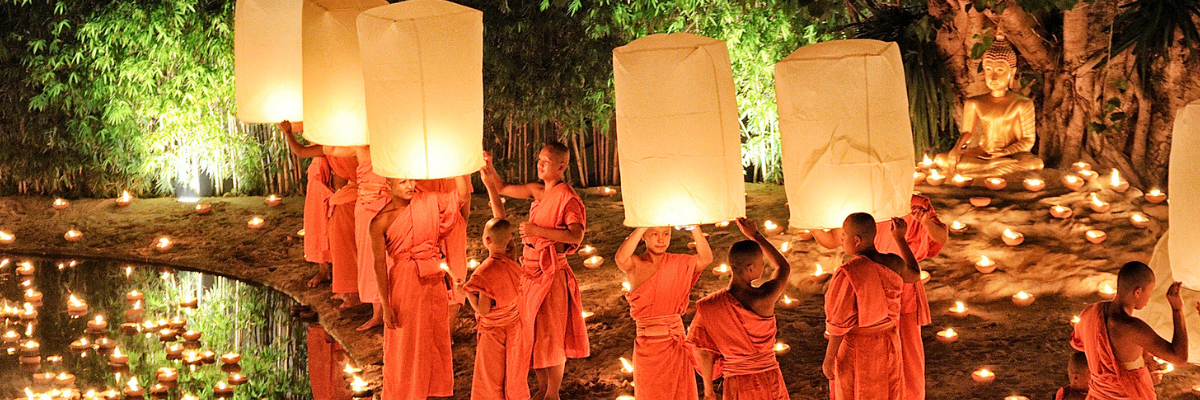Destination

Chiang Mai is a city in northern Thailand and the capital of the Chiang Mai Province. It is known for its rich history, cultural heritage, and natural beauty. The city is surrounded by lush green hills and mountains, making it a great base for outdoor activities. Chiang Mai has a thriving food and nightlife scene and is also home to numerous temples including the famous Wat Phra That Doi Suthep, which sits on a mountain overlooking the city.
There are several easy and affordable options for getting around Chiang Mai including:
Tuk-tuks: These are three-wheeled, open-air vehicles that can be found all over the city and are great for short trips or for exploring the city’s narrow streets and alleys.
Songthaews: These are red pickup trucks with covered benches in the back that are used as shared taxis. You can flag down a songthaew on the street and ask the driver where they’re going. The fare is usually fixed, and you’ll be sharing the ride with other passengers.
Bicycle: Cycling is a great way to explore Chiang Mai, especially in the Old City, where the streets are narrow and traffic is limited. You can rent bicycles from various shops and hotels, and there are also guided cycling tours available.
Grab and taxis: You can also use ride-hailing apps such as Grab or hail a taxi on the street. Taxis are metered.
The currency used in Chiang Mai, Thailand is the Thai baht (THB). The Thai baht is the official currency of Thailand and is divided into 100 satang. Bills come in denominations of 20, 50, 100, 500, and 1000 baht, while coins are available in denominations of 1, 2, 5, and 10 baht, as well as 25 and 50 satang. It’s recommended to have some Thai baht on hand when visiting Chiang Mai, as not all places accept credit cards or foreign currency. ATMs and currency exchange booths are widely available in the city.
Chiang Mai has a tropical wet and dry climate, characterised by warm to hot temperatures throughout the year with distinct wet and dry seasons.
August is during the rainy season, which typically lasts from June to October. During this time, the city experiences frequent rainfall, often in the form of short, heavy downpours in the afternoons and evenings. The temperatures during August see an average high of 31°C and an average low around 23°C. Don’t forget to pack a rain jacket and umbrella.
Shopping in Chiang Mai is a popular activity for both locals and tourists, with a variety of options available to suit all tastes and budgets.
One of the most famous shopping experiences is visiting the night markets, such as the famous Sunday Walking Street Market in the Old City. You will find anything from clothing and accessories, to handicrafts and local street food. This is a great way to experience the lively atmosphere of Chiang Mai.
Chiang Mai is also home to a number of modern shopping malls, such as Central Festival Chiang Mai and Maya Lifestyle Shopping Center. These malls offer a range of international and local brands, as well as restaurants, cinemas, and other entertainment options.
If you’re interested in traditional handicrafts, be sure to visit the Baan Tawai Village, which is located on the outskirts of the city, to see local artisans and craftspeople at work and to purchase handmade items such as woodcarvings, ceramics, and textiles.
The official language is Thai, however due to the city’s popularity as a tourist destination, English is widely spoken and understood, especially in hotels, restaurants and tourist areas.
You may hear other languages spoken such as Chinese, Japanese, Korean and German.
Learning a few basic Thai phrases can be helpful and appreciated when interacting with locals, such as saying “sawasdee” (hello), “khop khun” (thank you), or “sai tiao” (how much is it?).
However, even if you don’t speak Thai, you’ll likely be able to communicate effectively with the help of English and the friendly and hospitable nature of the people in Chiang Mai.
The standard electrical voltage in Chiang Mai is 220 – 240 volts and the frequency is 50 Hz. This is the standard voltage and frequency used in most of Southeast Asia and Europe.
Chiang Mai is famous for its delicious food and drink, which combines traditional Thai flavours with regional specialties and influences from neighbouring countries. Some of the most popular dishes to try in Chiang Mai are Khao Soi (traditional Northern Thai dish consisting of egg noodles in a creamy, spicy coconut milk curry, topped with crispy noodles and served with lime and pickled vegetables), Som Tam (spicy and sour papaya salad served with sticky rice and grilled meat) and Mango Sticky Rice (a popular dessert made with sticky rice that is cooked in coconut milk and served with fresh mango and a drizzle of sweet syrup).
Some drinks to try in Chiang Mai are Thai Iced Tea (sweet and creamy iced tea made with black tea, sugar and condensed milk), Chang Beer (popular Thai beer that is crisp and pairs well with spicy dishes) and fruit shakes (Chiang Mai is known for its delicious fruit shakes made from fresh tropical fruit like mango, pineapple and papaya, blended with ice and sugar).
Tipping is not required in Chiang Mai but is appreciated for good service and can be a way to support the local community and show your appreciation.
If you receive great service, you can leave a tip of around 10% of the total bill. In addition to tipping, you can also show your appreciation by leaving a positive review or feedback, as this can be very helpful for local businesses and service providers.
